The Resistible Rise of Arturo Ui, subtitled "A parable play", is a 1941 play by the German playwright Bertolt Brecht. It chronicles the rise of Arturo Ui, a fictional 1930s Chicago mobster, and his attempts to control the cauliflower racket by ruthlessly disposing of the opposition. The play is a satirical allegory of the rise of Adolf Hitler and the Nazi Party in Germany prior to World War II.

Mother Courage and Her Children is a play written in 1939 by the German dramatist and poet Bertolt Brecht (1898–1956), with significant contributions from Margarete Steffin. Four theatrical productions were produced in Switzerland and Germany from 1941 to 1952, the last three supervised or directed by Brecht, who had returned to East Germany from the United States.
The Mother is a play by the German modernist playwright Bertolt Brecht. It is based on Maxim Gorky's 1906 novel of the same name.
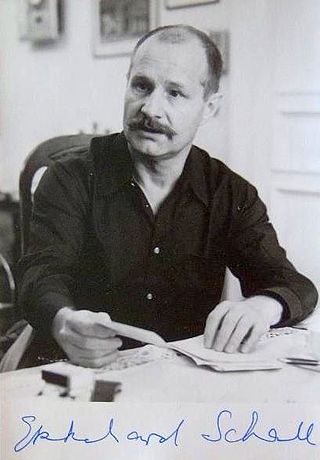
Ekkehard Schall was a German stage and screen actor/director.

Paul Dessau was a German composer and conductor. He collaborated with Bertolt Brecht and composed incidental music for his plays, and several operas based on them.
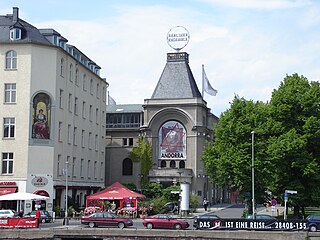
The Berliner Ensemble is a German theatre company established by actress Helene Weigel and her husband, playwright Bertolt Brecht, in January 1949 in East Berlin. In the time after Brecht's exile, the company first worked at Wolfgang Langhoff's Deutsches Theater and in 1954 moved to the Theater am Schiffbauerdamm, built in 1892, that was open for the 1928 premiere of The Threepenny Opera.

Mother Courage is a character from a Grimmelshausen novel Lebensbeschreibung der Ertzbetrügerin und Landstörtzerin Courasche dating from around 1670. The character had played a cameo role in Der abentheuerliche Simplicissimus in 1669.
Heinz Schubert was a German actor, drama teacher and photographer, best known for playing the role of Alfred Tetzlaff in the German television sitcom Ein Herz und eine Seele.
Peter Zadek was a German director of theatre, opera and film, a translator and a screenwriter. He is regarded as one of the greatest directors in German-speaking theater.

Angela Winkler is a German actress.
Girls in Gingham —sometimes called Beaverskin—is a 1949 German drama film directed by Kurt Maetzig.

The Farewell is a 2000 German drama film directed by Jan Schütte. It was screened in the Un Certain Regard section at the 2000 Cannes Film Festival.
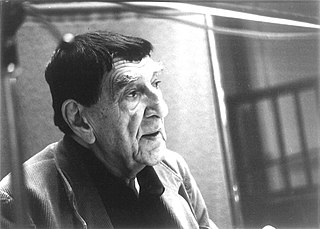
Wolf Kaiser was a German theatre and film actor. He grew up in Switzerland, where he studied chemistry and physiology. In 1937 he was deemed unfit for service in the Wehrmacht, and then went to Berlin where he trained as an actor.
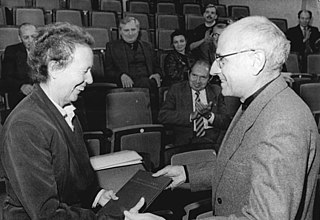
Manfred Wekwerth was a German theatre and film director and writer. He was the director of the Berliner Ensemble theatre from 1977 to 1991. He was also an informant for East Germany's Stasi from 1965 until the German reunification.
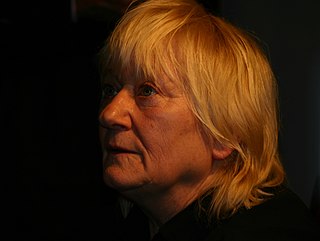
Carmen-Maja Antoni is a German actress.
Alfred Kirchner is a German actor, theatre director and theatre manager who is based in Berlin. He worked at theatres such as Theater Bremen, Schauspielhaus Bochum, the Burgtheater in Vienna and the Staatliche Schauspielbühnen Berlin, before turning to freelance work. He has staged productions in Europe and North America, including several world premieres of both drama and opera. He directed the premiere of Martin Walser's Ein Kinderspiel in Stuttgart in 1971, the U.S. premiere of Henze's We Come to the River at the Santa Fe Opera in 1984, and the premiere of Hans Zender's Stephen Climax at the Oper Frankfurt in 1986. In 1994, he staged Wagner's Der Ring des Nibelungen at the Bayreuth Festival.

Peter Palitzsch was a German theatre director. He worked with Bertolt Brecht in his Berliner Ensemble from the beginning in 1949, and was in demand internationally as a representative of Brecht's ideas. He was a theatre manager at the Staatstheater Stuttgart and the Schauspiel Frankfurt. Many of his productions were invited to the Berliner Theatertreffen festival. He worked internationally from 1980.
Ruth Wilhelmi-König was a German woman stage photographer.
Andre Asriel was an Austrian-German composer.

As part of an anti-communist campaign in Austria against the author Bertolt Brecht, his work was boycotted for ten years. Between 1953 and 1963, no established Viennese theater performed his works. The initiators were the publicists Hans Weigel and Friedrich Torberg as well as the Burgtheater director Ernst Haeussermann.












